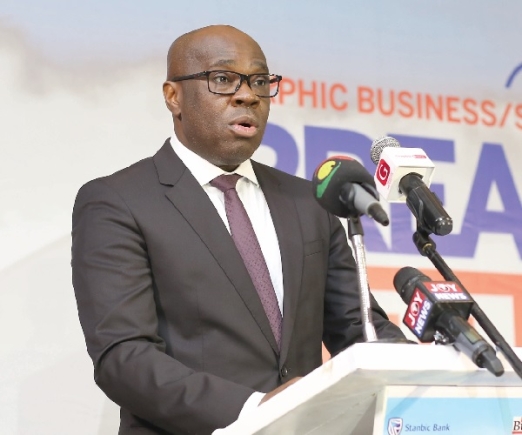
Stanbic Bank boss urges Parliament to safeguard national devt plan
THE Chief Executive of Stanbic Bank Ghana, Kwamina Asomaning, has stated that Ghana needs a long-term national development plan approved by Parliament to prevent constant policy shifts.
He said such approval was the only way to stop national priorities from changing every four years.
Speaking at the Graphic Business–Stanbic Bank Breakfast Meeting on the theme, Beyond Political Cycles: Creating Long-Term Development Pathways for Sustainable Investor Confidence, Mr Asomaning explained that without a firm plan backed by law, successive governments would continue to abandon projects started by their predecessors.
He said this undermines national progress and weakens public confidence in development efforts.
Continuity and trust
Mr Asomaning said continuity, was not a threat to democracy but rather a source of stability for citizens.
When national projects remain intact after elections, he said, people built trust in the development process and see the government as a reliable partner.
He added that investor confidence is also closely tied to predictability. Investors, he noted, want assurance that commitments made today would be honoured tomorrow, regardless of political changes.
According to him, the private sector performs better when development plans remain stable across administrations.
“Financing requires certainty and stability,” he said.
As President of the Ghana Association of Banks, Mr Asomaning stressed that the financial sector depended on long-term clarity to support national development.
He explained that banks plan and lend more confidently when they understand the direction of the economy.
He said Ghana could make meaningful progress only when the national agenda was protected from political swings.
Resetting plans after every election, he noted, makes it difficult to build strong institutions or attract long-term investment.
He pointed to countries that have maintained consistency in their development plans and asked why Ghana cannot adopt similar approaches to support its own growth.
Rooted framework
Mr Asomaning also called for a national plan grounded in Ghana’s priorities rather than heavy dependence on external frameworks such as the Sustainable Development Goals.
He said while global standards were helpful, Ghana must set its own clear path.
He argued that a strong development plan must be firm enough to define national direction but flexible enough for each government to innovate.
“The baseline plan must be cast in stone. It can be stable, yet flexible,” he said.
He encouraged policymakers to consider the safeguards needed to protect national direction through political transitions.
National reflection
Mr Asomaning questioned whether Ghana could truly prosper if each administration restarted the development agenda.
He said the country needs a blueprint that is credible enough to inspire long-term investment and broad enough to respond to emerging issues.
He urged policymakers, experts and stakeholders to help design a plan that moves Ghana away from short-term decision-making that benefits only a few.
He said such a plan was essential if Ghana was to build the consistency required for sustained national development.